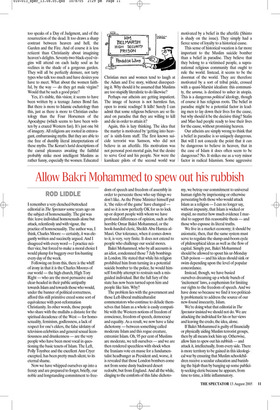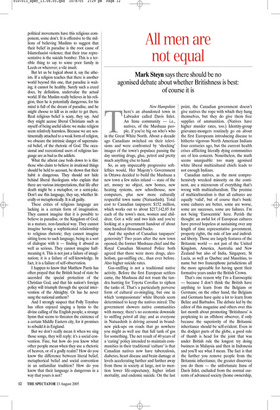Allow Bakri Mohammed to spew out his rubbish
ROD LIDDLE
I remember a very clenched-buttocked editorial in The Spectator some years ago on the subject of homosexuality. The gist was this: leave individual homosexuals alone but attack, relentlessly and with vigour, the practice of homosexuality. The author was, I think, Charles Moore — certainly, it was elegantly written and succinctly argued. And I disagreed with every word — I practice neither vice, but forced to make a moral choice I would plump for buggery over fox-hunting every day of the week.
Following on from this, there is the whiff of irony in that it is the Charles Moores of our world — the high church, High Tory Right — who are the most persuasive and clear-headed in their public antipathy towards Islam and towards those who would, under the banner of political correctness, afford this still primitive creed some sort of equivalence with post-reformation Christianity. In other words, those people who share with the mullahs a distaste for the spiritual decadence of the West — for homosexuality, feminism, godlessness, a lack of respect for one’s elders, the false idolatry of television celebrities and general sexual licentiousness and drunkenness — are the very people who have been most vocal in questioning the basic tenets of Islam. The Left, Polly Toynbee and the excellent Ann Cryer excepted, has been pretty much silent, to its eternal shame.
Now we have whipped ourselves up into a frenzy and are prepared to forget, briefly, our noble and longstanding commitment to free dom of speech and freedom of assembly in order to persecute those who say things we don’t like. As the Prime Minister himself put it, ‘the rules of the game’ have changed and so it is now perfectly OK for us to lock up or deport people with whom we have profound differences of opinion, such as the horrible Omar Bakri Mohammed, or the hook-handed cleric, Sheikh Abu Hamza alMasri. Our tolerance, when it comes down to it, is very, very finite. It does not extend to people who challenge our social mores.
Bakri Mohammed, who by all accounts is an idiot, condemned those 7 July bombings in London. He stated that while his religion prohibited him from turning in a potential suicide bomber to the police, he would himself forcibly attempt to restrain such a misguided individual. But the full fury of the state has now been turned upon him and people like him. Why?
The problem lies with the government and those Left-liberal multiculturalist commentators who continue to delude themselves that Islam as a whole is easily compatible with the Western notions of freedom of conscience, freedom of speech, democracy and equality. As a result, we now have a false dichotomy — between something called moderate Islam and this rogue creature, extremist Islam. Oh, 95 per cent of Muslims are moderate, we tell ourselves — and we are then rendered speechless with shock when the Iranians vote en masse for a fundamentalist headbanger as President and, worse, it is revealed that those London bombers come not from some dusty backward desert redoubt, but from England. And all the while, clinging to the comforts of this false dichoto my, we betray our commitment to universal human rights by imprisoning or otherwise persecuting both those who would attack Islam as a religion — I can no longer say, without impunity, that Islam is wicked or stupid, no matter how much evidence I marshal to support this reasonable thesis — and those who espouse its literal truths.
We live in a market economy; it should be axiomatic, then, that the same system must serve to regulate the slump-and-boom cycle of philosophical ideas as well as the flow of capital. Simply put, Bakri Mohammed should be allowed to spout his ur-Monday Club poison — and his ideas should sink or swim depending upon the level of popular concordance.
Instead, though, we have busied ourselves dreaming up a whole bunch of ‘incitement’ laws, a euphemism for limiting our rights to the freedom of speech. And we have done so because we find it too politically problematic to address the source of our new-found insecurity, Islam.
We’re doing what that editorial in The Spectator insisted we should not do. We are attacking the individual for his or her views and leaving the credo, the idea, alone.
If Bakri Mohammed is guilty of financially or physically aiding Muslim terrorist groups, then by all means lock him up. Otherwise, allow him to spew out his rubbish — and attack it, intellectually, from every side. There is more territory to be gained in this ideological war by ensuring that Muslim schoolchildren receive a secular education and banishing the hijab than by banging up some publicity-seeking cleric because he appears, from time to time, a little inflammatory. political movements have this religious component, some don’t. It is offensive to the millions of believing Muslims to suggest that their belief in paradise is the root cause of Islamofascist violence; that their true representative is the suicide bomber. This is a terrible thing to say to some poor family in Leeds or wherever; a vile insult.
But let us be logical about it, say the atheists. If a religion teaches that there is another world beyond this one, that paradise is waiting, it cannot be healthy. Surely such a creed does, by definition, undervalue the actual world. If the Muslim really believes in his religion, then he is potentially dangerous, for his mind is full of the dream of paradise, and he might choose to kill us in order to get there. Real religious belief is scary, they say. And they might accuse liberal Christians such as myself of being useful idiots: we make religion seem relatively harmless. Because we are sentimentally attached to a weak form of religion, we obscure the intrinsic danger of supernatural belief, of the rhetoric of God. The occasional and recreational users of religious language are as bad as the addicts.
What the atheist case boils down to is this: those who claim to believe in irrational things should be held to account, be shown that their habit is dangerous. They should not hide behind liberal theologians who explain that there are various interpretations, that life after death might be a metaphor, or a semi-joke. Don’t use this language, they say, whether literally or metaphorically. It is all guilty.
These critics of religious language are lacking in a certain form of imagination. They cannot imagine that it is possible to believe in paradise, or the Kingdom of God, in a mature, non-fanatical way. They cannot imagine having a sophisticated relationship to religious rhetoric; they cannot imagine sitting loose to such language, being in a sort of dialogue with it — finding it absurd as well as serious. They cannot imagine halfmeaning it. This is not just a failure of imagination; it is a failure of self-knowledge. In fact, it is a failure of self-observation.
I happen to know that Matthew Parris has often prayed that the British head of state be accorded the special protection of the Christian God, and that his nation’s foreign policy will triumph through the special intervention of the Almighty. Or has he never sung the national anthem?
And I strongly suspect that Polly Toynbee has often enjoyed singing a hymn to the divine calling of the English people; a strange hymn that seems to threaten the existence of a certain Middle Eastern city, for it promises to rebuild it in England.
But we don’t really mean it when we sing those songs, they will reply; it’s a social convention. Fine, but how do you know what other people mean when they use a rhetoric of heaven, or of a godly realm? How do you know the difference between literal belief, metaphorical belief and social convention in an unfamiliar tradition? How do you know that their language is dangerous in a way that yours is not?












































 Previous page
Previous page